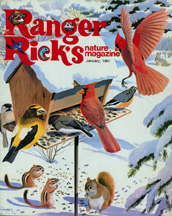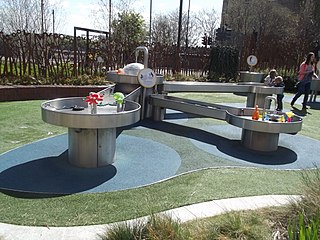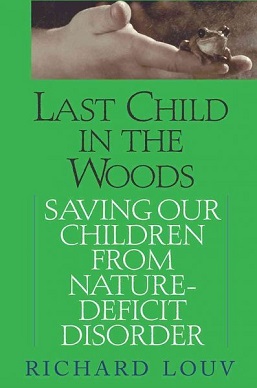Related Research Articles

Assistive technology (AT) is a term for assistive, adaptive, and rehabilitative devices for people with disabilities and the elderly. Disabled people often have difficulty performing activities of daily living (ADLs) independently, or even with assistance. ADLs are self-care activities that include toileting, mobility (ambulation), eating, bathing, dressing, grooming, and personal device care. Assistive technology can ameliorate the effects of disabilities that limit the ability to perform ADLs. Assistive technology promotes greater independence by enabling people to perform tasks they were formerly unable to accomplish, or had great difficulty accomplishing, by providing enhancements to, or changing methods of interacting with, the technology needed to accomplish such tasks. For example, wheelchairs provide independent mobility for those who cannot walk, while assistive eating devices can enable people who cannot feed themselves to do so. Due to assistive technology, disabled people have an opportunity of a more positive and easygoing lifestyle, with an increase in "social participation", "security and control", and a greater chance to "reduce institutional costs without significantly increasing household expenses." In schools, assistive technology can be critical in allowing students with disabilities to access the general education curriculum. Students who experience challenges writing or keyboarding, for example, can use voice recognition software instead. Assistive technologies assist people who are recovering from strokes and people who have sustained injuries that affect their daily tasks.

Childcare, also known as day care, is the care and supervision of one or more children, typically ranging from two weeks to 18 years old. When describing a business class, 'daycare' is usually written as a single word. Although most parents spend a significant amount of time caring for their child(ren), childcare typically refers to the care provided by caregivers who are not the child's parents. Childcare is a broad topic that covers a wide spectrum of professionals, institutions, contexts, activities, and social and cultural conventions. Early childcare is an important and often overlooked component of child development.
A form of child abuse, child neglect is an act of caregivers that results in depriving a child of their basic needs, such as the failure to provide adequate supervision, health care, clothing, or housing, as well as other physical, emotional, social, educational, and safety needs. All societies have established that there are necessary behaviours a caregiver must provide for a child to develop physically, socially, and emotionally. Causes of neglect may result from several parenting problems including mental disorders, unplanned pregnancy, substance use disorder, unemployment, over employment, domestic violence, and, in special cases, poverty.

The National Wildlife Federation (NWF) is the United States' largest private, nonprofit conservation education and advocacy organization, with over six million members and supporters, and 51 state and territorial affiliated organizations (including Puerto Rico and the Virgin Islands).
Speech delay, also known as alalia, refers to a delay in the development or use of the mechanisms that produce speech. Speech – as distinct from language – is the actual process of making sounds, using such organs and structures as the lungs, vocal cords, mouth, tongue, teeth, etc. Language delay refers to a delay in the development or use of the knowledge of language.

Ranger Rick, originally Ranger Rick's Nature Magazine, is a children's nature magazine that is published by the United States National Wildlife Federation. The magazine offers feature articles and activities for children ages 8 and up in order to spark their interest in the outdoors and encourage them to become more actively involved in protecting the environment. The magazine's primary intention is to instill a passion for nature and promote activity outdoors. NWF also publishes two companion magazines, Ranger Rick Jr., which is aimed at ages 4–8, and Ranger Rick Cub, which is aimed at kids 0–4 years old.
Factitious disorder imposed on another (FDIA), also known as fabricated or induced illness by carers (FII) and first named as Munchausen syndrome by proxy (MSbP) after Munchausen syndrome, is a mental health disorder in which a caregiver creates the appearance of health problems in another person, typically their child, and sometimes (rarely) when an adult simulates an illness in another adult partner. This might include altering test samples or injuring a child. The caregiver or partner then presents the person as being sick or injured. Permanent injury or death of the victim can occur as a result of the disorder. The behaviour might be motivated by the caregiver or partner seeking sympathy or attention.

Forest kindergarten is a type of preschool education for children between the ages of three and six that is held almost exclusively outdoors. Whatever the weather, children are encouraged to play, explore and learn in a forest environment. The adult supervision is meant to assist rather than lead. It is also known as Waldkindergarten, outdoor nursery, or nature kindergarten.

Day camps also known as summer camps in some areas, are recreational programs designed to provide children with a fun and enriching experience during the summer or school breaks. Unlike residential or overnight camps, day camps operate during daytime hours, allowing children to participate in various activities and return home each evening. These camps offer a wide range of supervised activities, fostering socialization, learning, and personal growth in a safe and supportive environment. Day camps can be booked by the day or by the week, or month depending on the institution organizing them. Programs are typically available for kids ages 3-17, but the specific age range can vary depending on the camp's focus and structure. The most popular ages for summer day camps are typically ages 5-10.

Nature-deficit disorder is the idea that human beings, especially children, are spending less time outdoors than they have in the past, and the belief that this change results in a wide range of behavioral problems.

A playscape is either a piece of land modified for children's play, a particular structure on a playground, or a nontraditional type of play environment. Landscape architects and designers are increasingly using the term to express areas of cities that encourage interaction and enjoyment for all ages. The term was probably first used in the mid-twentieth century, possibly first attributable to the National Institute for Architectural Education in 1957, and associated in the 1960s with the New York-based Playground Corporation of America. It is mentioned by Joe Frost in his 1992 book, Play and Playscapes, referring to attempts to replace or add on to the rubberized surface, metal and plastic of traditional playgrounds.

A green museum is a museum that incorporates concepts of sustainability into its operations, programming, and facility. Many green museums use their collections to produce exhibitions, events, classes, and other programming to educate the public about the natural environment. Many, but not all, green museums reside in a building featuring sustainable architecture and technology. Green museums interpret their own sustainable practices and green design to present a model of behavior.

Last Child in the Woods: Saving Our Children From Nature-Deficit Disorder is a 2005 book by author Richard Louv that documents decreased exposure of children to nature in American society and how this "nature-deficit disorder" harms children and society. The author also suggests solutions to the problems he describes. A revised and expanded edition was published in 2008.

Richard Louv is an American non-fiction author and journalist. He is best known for his seventh book, Last Child in the Woods: Saving Our Children From Nature-Deficit Disorder, which investigates the relationship of children and the natural world in current and historical contexts. Louv created the term "nature-deficit disorder" to describe possible negative consequences to individual health and the social fabric as children move indoors and away from physical contact with the natural world – particularly unstructured, solitary experience. Louv cites research pointing to attention disorders, obesity, a dampening of creativity and depression as problems associated with a nature-deficient childhood. He amassed information on the subject from practitioners of many disciplines to make his case and is commonly credited with helping to inspire an international movement to reintroduce children to nature.
The Children & Nature Network was founded in 2006 by a group of educators, writers, and community leaders who share a deep concern about children's disconnection from nature. The Children & Nature Network was created to encourage and support the people and organizations working to reconnect children with nature. The organization provides access to the latest news and research in the field and a peer-to-peer network of researchers and individuals, educators and organizations dedicated to children's health and well-being.
Family Nature Summits are annual gatherings that offer a mix of environmental and outdoor education and adventure, with notable environmental and wildlife educators providing classes and activities for adults and children. Called "Conservation Summits" until 2000, the National Wildlife Federation (NWF) held the first Summit on July 20–25, 1970, at the YMCA of the Rockies, Rocky Mountain National Park, Colorado. There have been 119 Summits since 1970, with notable environmental educators, naturalists, authors and artists such as Robert Michael Pyle, Jim Halfpenny, Clare Walker Leslie, Roger Tory Peterson, Annie Tiberio Cameron, Steve Torbit, and Craig Tufts serving as faculty at many of the Summits. The organization's objectives focus on entertaining educational nature programming for youth, teens, and young adults, led by nationally recognized environmental educators such as Steve Houser, recipient of the 2009 Edward C. Roy, Jr. Award For Excellence in K-8 Earth Science Teaching.

The No Child Left Inside movement in the United States seeks to encourage and provide funding for environmental education. Its stated goals include the enhancement of environmental literacy between kindergarten and 12th grade and fostering of understanding, analysis, and solutions to environmental challenges.

Screen time is the amount of time spent using a device with a screen such as a smartphone, computer, television, video game console, or a tablet. The concept is under significant research with related concepts in digital media use and mental health. Screen time is correlated with mental and physical harm in child development. The positive or negative health effects of screen time are influenced by levels and content of exposure. To prevent harmful exposure to screen time, some governments have placed regulations on its usage.

The Greening of Detroit is a 501(c)(3) non-profit environmental organization whose mission is to inspire the sustainable growth of a healthy urban community through trees, green spaces, healthy living, education, training and job opportunities. The Greening serves communities in Detroit, Highland Park and Hamtramck, Michigan.

Nature Cat is an educational animated children's television series that aired from November 25, 2015 to January 2, 2024 on PBS Kids and is aimed at children aged 3–8. The series follows the adventures of four main characters: Nature Cat, Hal the Dog, Squeeks the Mouse, and Daisy the Bunny. The show has been nominated for a Daytime Emmy Award for "Outstanding Writing in an Animated Program". The series debut in November achieved nearly 3.7 million viewers, and by March it has achieved 69 million video streams across online platforms. As of October 2016, Nature Cat has been renewed for a second and third season. The second season premiered on January 1, 2018. Then the third season premiered on April 18, 2019. In 2021, the show was renewed for a fourth and fifth season. The fourth season premiered on May 9, 2022, while the fifth and final season premiered on April 17, 2023.
References
- ↑ NWF's "Be Out There" program website
- ↑ Author Richard Louv's website
- ↑ NWF's "Why Be Out There" web page
- ↑ Miami Herald article about Green Hour
- ↑ Washington Post article about Green Hour
- ↑ Kaiser Family Foundation
- ↑ "NWF's Green Hour Blog". Archived from the original on 2010-01-18. Retrieved 2008-10-17.
- ↑ "NWF's Green Hour Community Corner". Archived from the original on 2010-01-19. Retrieved 2008-10-17.
- ↑ NWF's Green Hour NatureFind